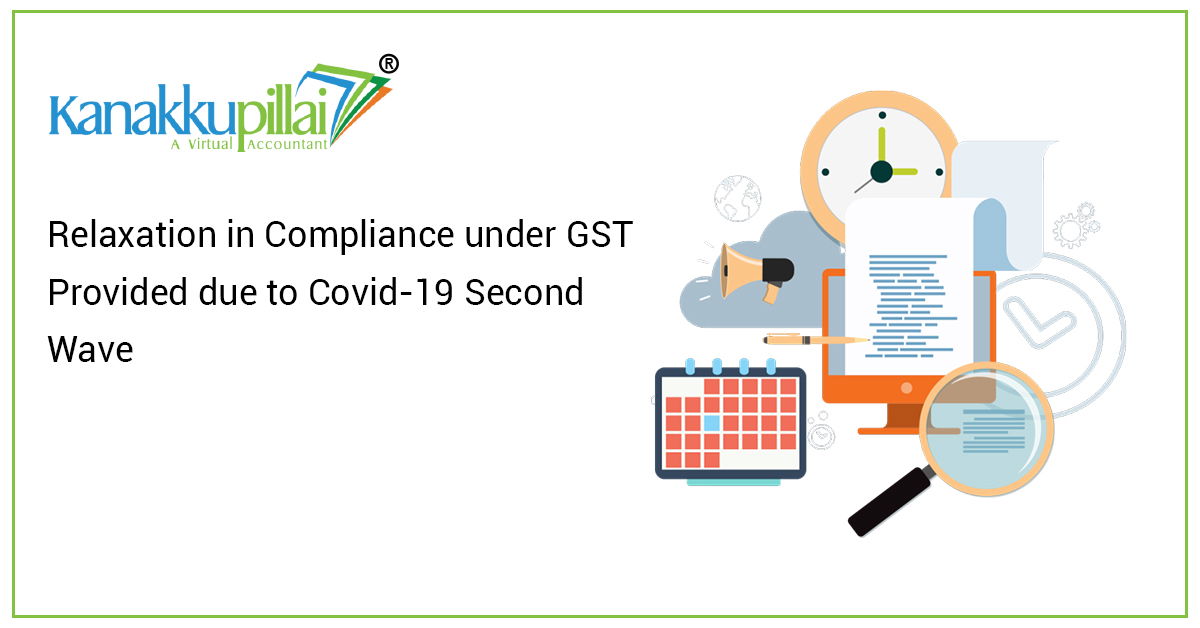Relaxation in Compliance under GST Provided due to Covid-19 Second Wave
As the second wave of the pandemic caused by the Covid 19 virus has hit our country and its economy, the GST Council in its 43rd Meeting which was held on 28th of May 2021, decided to provide certain relaxations for the compliances that should be done with respect to April and May 2021.
Various notifications were released with regard to the same and the summary of this has been given below:
| SL. NO. | NOTIFICATION | SUBJECT MATTER | PROVISION |
| 1 | Notification No. 16/2021 | Amendment with retrospective effect in Section 50 of CGST Act 2017. It shall become effective from 01.07.2017 for payment of interest only on net tax liability which is payable in cash (Introduced vide finance act 2021) | Interest here shall become applicable only on the net cash liability of the taxpayer. |
| 2 | Notification No. 17/2021 | Regarding GSTR-1 for April 2021 and GSTR-1 for May 2021 |
– The due date for filing GSTR -1 for April 2021 has been extended to the 26th of May 2021. – The due date for filing of GSTR -1 has been extended to 26th June 2021. |
| 3 | Notification No. 18/2021 | Interest Rate for March, April, and May 21 period OR The Quarter ending March 2021 |
– If Turnover is above INR 5 crores in the FY, then interest at the rate of 9% for the first 15 days from the due date and then at the rate of 18% thereafter, shall be applicable.
– If the Turnover is up to INR 5 crore in the FY, Then for March 2021, the following shall be applicable: Days from due date: Then for the month of April 2021, the following shall be applicable: Days from the due date Again, for the month of May 2021, the following shall be applicable: Days from the due date |
| 4 | Notification No. 19/2021 | Late Fee for GSTR-3B March, April, and May month OR Quarter ending March 2021 AND Maximum late fee for GSTR-3B returns late filing from June 2021 onwards. |
– If the Turnover is greater than INR 5 crores in the previous FY then, Nil late fees shall be applicable for the first 15 days from the due date.- If the is Turnover up to INR 5 crore in the previous FY, then; In March 2021- Nil late fees for the first 60 days from the due date, shall be applicable.On April 2021-Nil late fees for the first 45 days from the due date. On May 2021-Nil late fees for the first 30 days from the due date. For the Quarter ending on March 2021- the NIL Late fee for 60 days from the due date, shall also be applicable. 1. If Tax payable as per the return is nil – then INR 500 shall be applicable as late fees. 2. Otherwise, if the turnover is up to INR 1.5 crore in the FY, then INR 2000 shall be levied |
| 5 | Notification No. 20/2021 | Maximum late fee for late filing of GSTR-1 returns from June 2021 onwards. | a. If sales or turnover reported as per return is nil, then INR 500 shall be applicable. b. Otherwise, if turnover is up to INR 1.5 crore in the FY, then INR 2,000 shall be applicable.ORIf turnover is more than INR 1.5 crore and up to INR 5 crore in FY then INR 5,000 shall be applicable. |
| 6 | Notification No. 21/2021 | Maximum late fee for late filing of GSTR-4 returns from FY 2021-22 onwards. | a. If turnover reported as per Return is nil- then INR 500shall be applicable. b. Otherwise the late fee shall be INR 2,000, shall be applicable. |
| 7 | Notification No. 26/2021 | GST ITC-04 due date for the quarter ending March 2021. | The filing of Good sent or received to or from the Job worker return, for the quarter ending March 2021 has been extended to 30th June 2021. |
| 8 | Notification No. 27/2021 | Regarding Rule 36(4) | The cumulative ITC is to be checked for April, May, and June 2021. This means that the GSTR-2A/2B ITC is to be checked on a cumulative basis for April, May & June 2021. IFF (Invoice Furnishing Facility) for May 2021 can be filed till 28th June 2021. |
The pandemic has made survival and running of business also tough for every individual and payment of taxes is not different in any sense. So, it is vital that the government and the taxpayers take steps for handling and finding out solutions that would help the taxpayers reduce their burden and also ensure that the government is able to earn their revenue without any failure.





